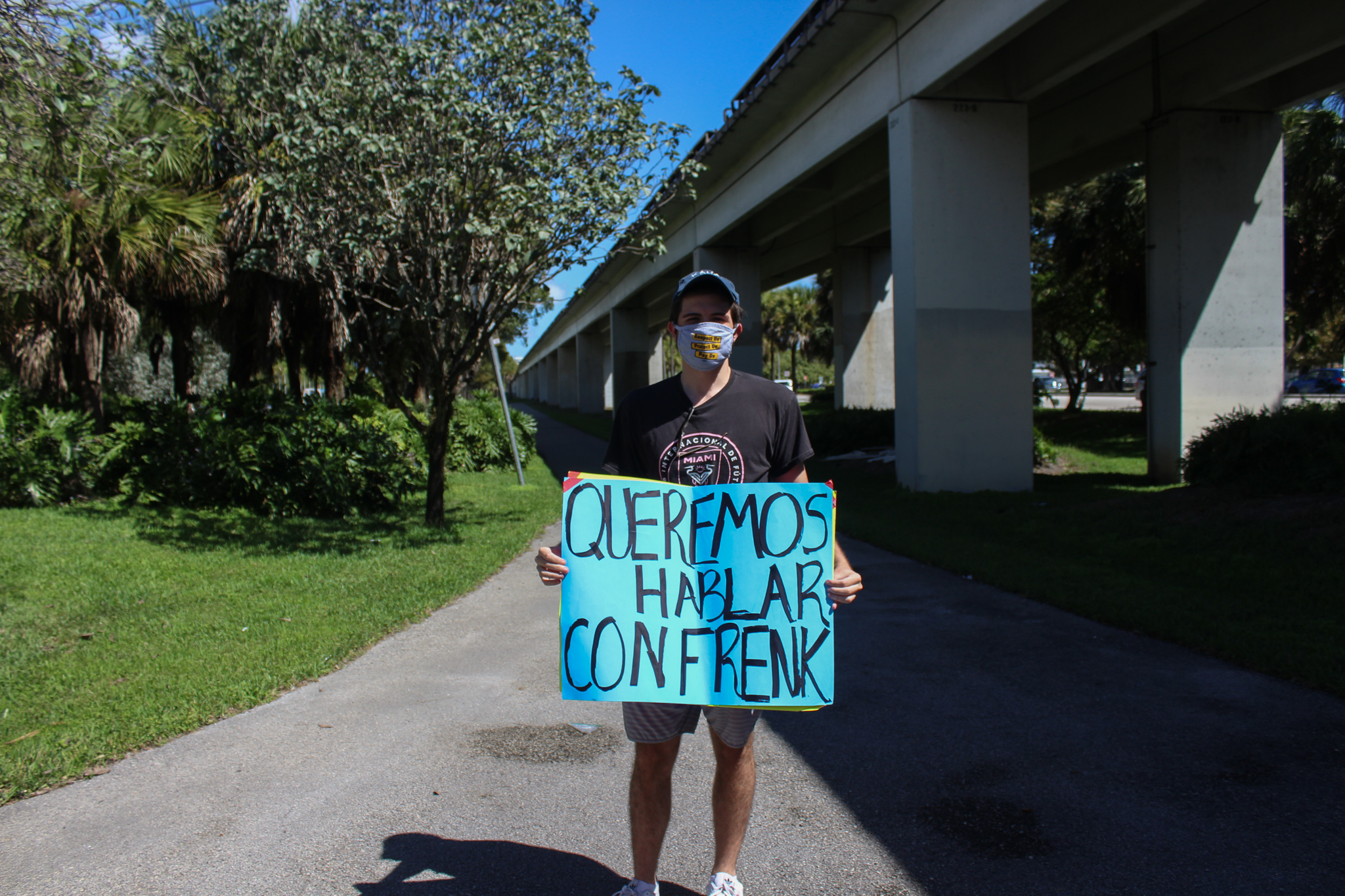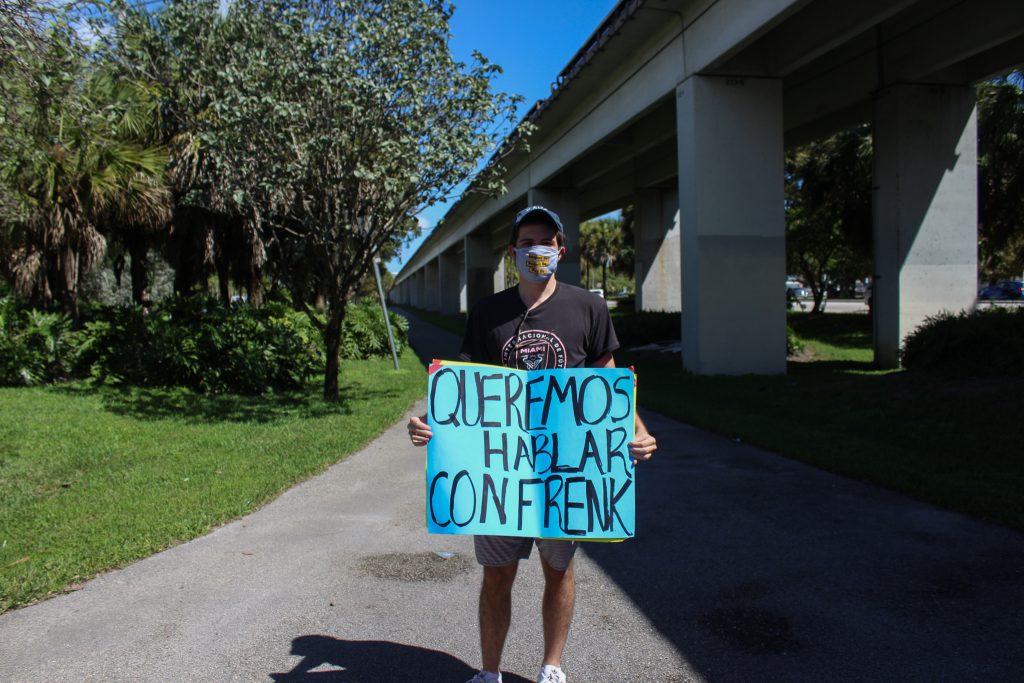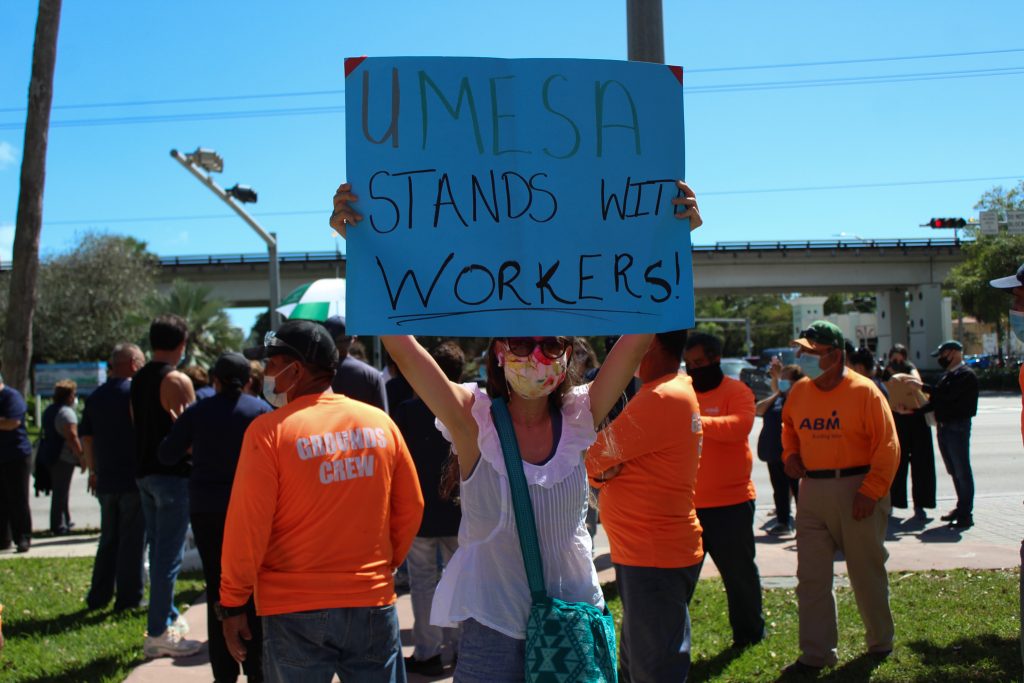
After a 68-year-old janitorial worker with preexisting health conditions at the University of Miami refused to fumigate inside the freshman towers due to insufficient personal protective equipment, he was sent home from work and suspended without pay for the day.

Complaints over PPE are one of the many grievances ABM workers have expressed to their supervisors throughout the COVID-19 pandemic. The facilities management company is subcontracted by UM to provide custodial services, grounds maintenance and pest control services.
The worker who refused to fumigate over safety concerns and exposure to strong disinfectants said when employees do express concerns to management, they respond angrily, telling them they must fumigate and follow company orders.
“They get angry when I don’t want to risk my life,” the worker said.
All of the workers who contributed to this article requested anonymity over job security concerns.
The workers complain of the working conditions in Mahoney-Pearson Residential Colleges, where on-campus students are in COVID-19 quarantine after testing positive. ABM workers point to the lack of air conditioning, resulting in one worker’s hospitalization and another who was also hospitalized after an allergic reaction to the number of cleaning materials they use.
According to another ABM employee, the workers only receive one blue surgical mask per eight-hour shift in addition to a pair of gloves.
They are working in areas where there are indeed positive COVID-19 cases without them even knowing. This stands in juxtaposition to the nurses who are in full protection, tending to the COVID-19 positive students. The worker explained the nurses were shocked that ABM janitorial workers had to clean in areas with many COVID cases.
Last semester, it was discovered that the university used stock footage in representing the disinfection process on campus. The videos showed workers disinfecting surfaces in hazmat suits, which many said was not representative of what was happening on campus.
While the workers explained they are very concerned about contracting COVID-19 considering their ages and some having health conditions, they say ABM is not taking it seriously.
“They are taking it very nonchalantly,” said an older, concerned worker. “They hide so many things from us like information and they don’t establish [protocols.].
Another echoed that sentiment: “They don’t care,” said a worker with four chronic underlying health conditions, including HIV and diabetes. “They only care about people coming here and working.”
Workers allege ABM is purposely hiding the number of positive cases to ensure an adequate number of staff members and to avoid paying quarantine time off.
“The university is prioritizing their economic situation more than the health of the people, whether it be the students, faculty or the employees,” said the worker who requested anonymity. “ABM [doesn’t] want to pay for testing; they don’t want to pay the two weeks if you do become positive. There could be positive tests, but we could never know.”
Workers were hopeful after the university and ABM notified them in December that vaccine roll out would begin. However, some say since then, they have not been told when they will be vaccinated. A worker told The Hurricane they were promised vaccines two or three months ago, yet, have not heard anything since.
Instead, the worker decided to make an appointment with the state for a vaccine since the university and ABM have been unable to provide them to the workers as originally promised.
When The Miami Hurricane reached out to ABM, they said, “All employees, who work in quarantine or isolation areas at the University, have been offered access to vaccines through the university.”
The worker added she feels the way ABM workers have been treated throughout the course of the pandemic is revealing the university’s and ABM’s priorities. The workers say they can only get tested if they report to their managers that a family member tested positive for the virus. They say they do not have the ability to seek testing whenever they please like other students and faculty.
Yet, ABM contends team members are offered free COVID-19 testing through UM if they believe they are exposed to the virus.
“If a team member develops COVID-19 symptoms and/or believes they may have been exposed to COVID-19, the team member is offered free COVID-19 testing through UM,” ABM told The Miami Hurricane via email.
But, workers say testing is not easily accessible. In order to get tested, they allege, ABM must approve the test, at which point if a worker was to test positive they are eligible for paid time off. They believe ABM does not encourage workers to get tested. If they seek testing independently, then they are obligated to stay home without pay until they receive a negative result.
Additionally, many expressed a lack of transparency from their supervisors and upper-level management. They allege they are not officially notified if they have been exposed, rather they hear through speaking to one another. A worker said she often has to press management to test potentially exposed workers. Another said finally after enough pressure, they began posting advisories of positive cases, which excludes student cases.
In regards to informing workers about positive cases, ABM said, “If an ABM team member tests positive, or has symptoms, they are directed to call the UM Hotline. UM traces anyone that may have been in close contact with a person suspected or known to have COVID-19. ABM posts notices to inform team members that someone has tested positive or has symptoms and the location where they worked.

All of the workers’ grievances were encapsulated at another march around the Coral Gables campus on Feb. 26 where they demanded better protections. Students and faculty who are members of the University of Miami Employment Student Alliance, an organization which supports subcontracted workers at the university, marched in solidarity with the workers to help fight for better working conditions.
“UMESA marched alongside those who experience the tremendous stress of a double crisis: workplace exploitation during a pandemic,” UMESA member and graduate student Mars Fernandez told The Miami Hurricane. “The same administration silences and is even hostile to the voices of subcontracted employees — often elders, immigrants, and disproportionately Black and brown.”
UMESA joined the subcontracted workers as part of “die-in” on campus last semester.
The university declined to comment for this article and deferred all questions to ABM.





